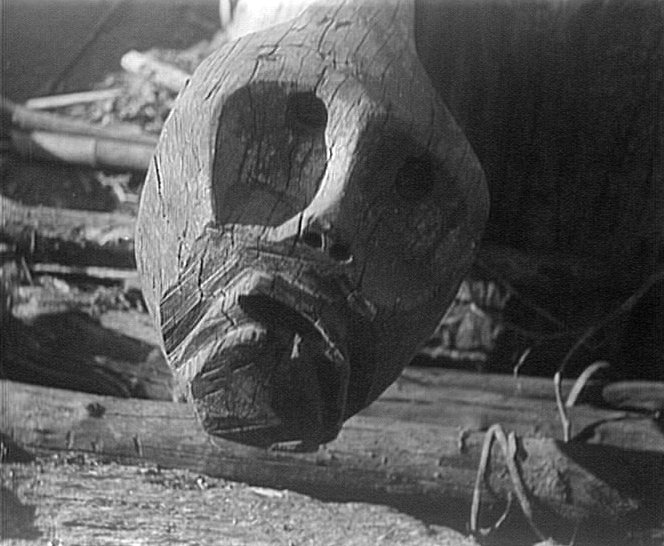A woman went to the fields, taking zao kasang. It was a cloudy day and she did not feel thirsty. Next day she said: “It will be like yesterday, there will be no sun,” so she did not take zu with her. It was very hot and she felt very thirsty. Above the river the elephant had made a pond. The woman came to drink water and found none and she went on to the pond and asked the elephant for water.
“There is a child in your womb and unless you give it to me I will not give you water,” said the elephant.
“Then I will not drink,” she said and went away.
Later she was ready to die with thirst. “If I give, I give,” she said and went back and sold the child in her womb for water.
When she came home she said to her husband: “In my womb is a child and I have sold it.” Her husband upbraided her, and said: “We must buy a slave.” They kept many children to confuse the elephant.
When their child was yet young, the elephant asked: “Is she of marriageable age?” They answered: “Not quite as yet.” The elephant asked again.
“Oh, now she is marriageable,” they said, and the elephant came to fetch her.
The parents made a hole in the ground and put their daughter in there and covered it over with stones, and put a slave-girl in the house.
“That is the girl,” they told the elephant. The elephant said: “No, that is not the girl.”
The parents brought out all the slave-girls together and said: “These are all our children. Take which you like.”
“No,” said the elephant. “They are slaves, they are not your children.”
“There are no more,” said the parents.
“I shall take away the girl from near you, and you will weep bitterly,” said the elephant, and he tore up the stones and carried away the girl. The girl wept.
“My parents have sent me in marriage to a place of death,” she cried out. “Let those who love me and want to marry me come.”
Two young men followed after. They arrived at the elephant’s house. One young man was brave, the other was cowardly. The elephant slept, and they each came with a porcupine’s quill and stabbed him and the elephant said: “Bah! Insects are biting me.” Then he said: “I smell human beings.”
The girl said: “I have only just come, I am a Naga; for this reason there is human scent.”
When it was morning the girl said to the elephant: “You must go like the Nagas and fetch food from the jungle.” So the elephant went and the young men came to the girl.
“Can you two fight the elephant?” This she said to the young men.
“Yes, we can,” they said.
“If you can, then eat as much as the elephant and drink as much as he does,” she said. She gave them much rice and they ate it all and much zu also.
“The elephant’s pool is here,” she said. “Go and splash as the elephant does and empty it.” They went and splashed and made it quite empty.
“Oh, then if there is a fight with the elephant you will win,” she said. “I will go.” She took a basket made of iron. The iron went “Bing!” and the elephant came running. They met.
“We will fight,” they said. They fought. The elephant trumpeted furiously in fighting. Tingwong [spirit of the sky] was displeased with the elephant’s trumpeting. He told the girl: “If you prefer the elephant, do not cut, but if you prefer the young men, then cut a mpak leaf [a leaf which shakes when there is no wing; a jungle plant] and the elephant will fall.” She cut and the elephant fell down and died. When he died the young men took his tusks. In taking the tusks they said: “It is finished. We will go, taking the tusks.” One young man was brave, the other was a coward. There was a creeper spanning a river in flood. Underneath was a herameve’s [an evil spirit “like a monkey”, and a man-eater. Lives in a hole among rocks, like a porcupine, and near stream. Herameve (Gobin) Heramera (Asalu)] house. The coward said: “Brother, I will go first with the girl. Do you stand here.” This he said, wanting the girl for his wife. He went first with the girl. When the brave one was half-way across the coward cut the creeper and the brave one fell into the herameve’s house.
The herameve’s children saw him and were frightened and for one day dared not go home. Their mother came home from the jungle. They said: “What is there in our house? Is it a man or a devil or what?”
Their mother said: “He has come to be your father. Give him good food and watch him all the time wherever he goes. When he is fat we shall eat him.”
Wherever the young man went the herameve’s children went also, crying: “Father! Father!”
The young man took a seed of hega-ria [the biggest of the jungle creepers] and planted it by the river. It grew across the river. The herameve and her young were ready to eat him and talked of it. “To-day bring leaves. We will do a ceremony and kill a pig.” The children went, very happy. Hearing this, the young man said: “What shall I do? The creeper is still short. If I die, I die.” He went to the jungle, saying: “I shall ease myself.” “O father, we will go too,” said the children. They went. He said: “I shall make water.” He went up on the creeper and made water. The children were delighted and cried: “It’s raining, it’s raining!” and pulled their ears and played. The young man ran away across the creeper.
He arrived at his village. The people had moved to a new site. There was no one there. A jungle cat [of the kind called Heng-nye. Eaten by old men only – a leopard cat] had taken a bit of wood and was pounding at a pounding table. He caught it and said: “I am very hungry. I shall eat you.”
The cat said: “Don’t eat me. If you eat me you will never know where the new village is.”
The cat went to the new village and caught a fowl and went back plucking and plucking the feathers till it reached the young man.
“Eat,” said the cat. “You are very hungry.”
“No, no!” said the young man. “I will never eat it. You will never die. Sometimes come and eat in my house.”
The cat said: “I came plucking and plucking the feathers. Look for them and you will find the path.” The cat taught this to the young man. He went, and came to his former village.
The girl had gone intending to marry both the young men but the coward took her away. He was living with her in their former village. He went carrying his son to the dekachang. His wife was drying paddy. The young man came and saw her.
“Where has he gone?” he asked, saying the other man’s name. “He has gone to the dekachang,” she said.
The young man took a stick and waited by the door. The other man was in the dekachang, carrying his child and singing. He came and the young man struck him hard on the leg and broke his leg to pieces. He fell. The young man carried him to the dekachang and put him under the sleeping bench. He gave him no cloths, only food and drink to keep him alive. With much trouble he died. The young man said: “It is finished. He has had as much trouble as I had.” Then he married the girl. There is no more.
Ursula Graham’s Collection







